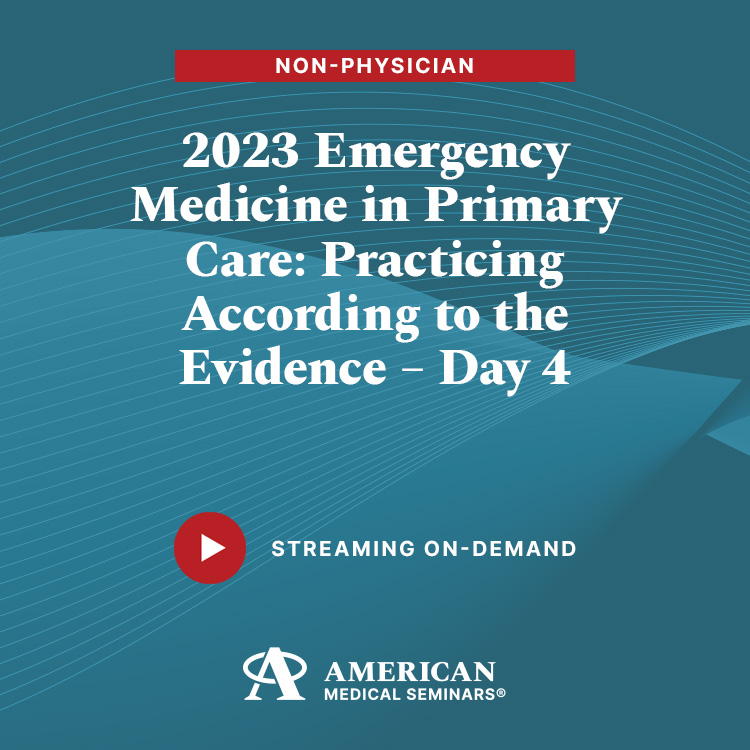Product Description
Title: 2023 Emergency Medicine in Primary Care: Practicing According to the Evidence – Day 4 (Non-Physician)
Faculty: Bryant Allen, M.D., F.A.C.E.P., F.A.A.E.M.; Andrew D. Perron, M.D., F.A.C.E.P., F.A.C.S.M.; and Michael E. Winters, M.D., M.B.A., F.A.C.E.P., F.A.A.E.M.
Release Date: 7/1/2023 Expiration Date: 7/1/2026
Day 4
Recent Critical Care Articles You’ve Got to Know!
Upon completion of this session, the participant should be able to: COMP,EBM
- Appraise key evidence-based medicine articles from the recent critical care and emergency medicine literature.
- Plan the integration of recent evidence into the practice of emergency medicine.
Crashing Obese Patient
Upon completion of this session, the participant should be able to: COMP
- Describe the anatomic and physiologic changes in the obese patient that affect emergent airway management.
- Discuss important changes to mechanical ventilation in the critically ill obese patient.
- Discuss critical changes to high-risk medications in the critically ill obese patient.
Early Goal Directed Therapy in Sepsis: Why All the Fuss?
Upon completion of this session, the participant should be able to: GL, COMP
- Determine the pathophysiology of sepsis and the sepsis syndrome.
- Evaluate the scope of the problem regarding effective management of sepsis in the ED.
- Appraise the principles of early goal-directed therapy in the treatment of sepsis.
- Employ the applicable “surviving sepsis” guidelines.
- Assess the potential gains that can be realized, as well as the pitfalls to avoid, in the management of sepsis utilizing early goal directed therapy.
Community Acquired Methicillin Resistant Staphylococcus aureus (CA-MRSA): An Update.
Upon completion of this session, the participant should be able to: EBM, COMP
- Assess risk factors for CA-MRSA infection.
- Specify the best-evidence management of skin and soft-tissue infections in the era of drug resistance.
- Assess both pharmacologic and non-pharmacologic management strategies for this disease entity.
- Demonstrate familiarity with the latest treatment recommendations for CA-MRSA as directed by the CDC.
Low Back Pain in the ED: What We Know, What We Think We Know, and What We Don’t Know.
Upon completion of this session, the participant should be able to: EBM, COMP
- Apply an evidence-based approach to the evaluation of non-traumatic back pain.
- Differentiate the “red flags” that should heighten the suspicion for serious pathology in the evaluation of back pain.
- Assess and differentiate both effective as well as disproved therapies in the treatment of back pain using the Cochrane Database.
- Specify potential pitfalls in the treatment and disposition of low back pain.
- The receipt for any incentive-associated purchase will designate the value of the gift card separately from the cost of the learning activity.
- This incentive may have implications on your tax reporting obligations. Any reimbursed amount must be declared as personal income for tax purposes.


